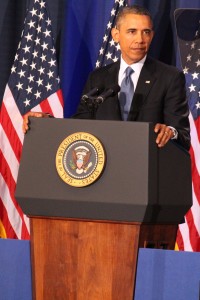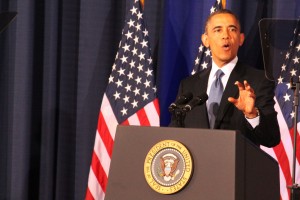WASHINGTON – President Barack Obama defended the use of drones to kill American-born Muslim cleric Anwar al-Awlaki and took on critics of the targeted killing program in a major counter-terrorism speech on Thursday.

President Barack Obama used a Thursday speech at the National Defense University in Washington to address the targeted killing of American-born Muslim cleric Anwar al-Awlaki and to formally address the topic of American drone policy. (Jennifer-Leigh Oprihory/MEDILL NEWS SERVICE)
But Obama also began to outline new measures and accountability for using drones, answering concerns in Congress and elsewhere about U.S. policy.
Attorney General Eric Holder sent a letter to Congress on Wednesday acknowledging that drone strikes killed al-Awlaki and three other Americans during counter-terrorism operations in Yemen and Pakistan.
To strike or not to strike– that is the question
Obama, speaking at the National Defense University, said he didn’t find any targeted killings of American citizens without due process to be constitutional, “with a drone or a shotgun.”
“But when a U.S. citizen goes abroad to wage war against America and is actively plotting to kill U.S. citizens, and when neither the United States nor our partners are in a position to capture him before he carries out a plot,” Obama countered, “his citizenship should no more serve as a shield than a sniper shooting down on an innocent crowd should be protected with a SWAT Team.”
“That’s who Anwar al-Awlaki was.”
Al-Awlaki, the New-Mexico-born chief of external operations for Al-Qaida in the Arabian Peninsula (AQAP), was killed during a Sept. 30, 2011 drone attack in Yemen.
Obama cited al-Awlaki’s history of involvement in the supervision, planning and/or support of terror plots in 2009 and 2010 to back up his position on the strike.
He said his decision to declassify the drone-related deaths of four American citizens was made “to facilitate transparency and debate on this issue and to dismiss some of the more outlandish claims that have been made.”
Still, the president emphasized that the attack on al-Awlaki was a last-resort move.
“I would have detained and prosecuted al-Awlaki if we captured him before he carried out a plot, but we couldn’t,” he said. “As President, I would have been derelict in my duty had I not authorized the strike that took him out.”
Obama also said that due to constitutional concerns involved with the targeting of an American, he communicated with the Department of Justice and Congress before the strike.
Drone policy
Obama also used the speech to outline an American drone-strike theory.
First, he said, the nation doesn’t use drone strikes when individual terrorist capture is a possibility.
“The preference is always to detain, interrogate and prosecute,” Obama said.
Next, he said, strike location isn’t solely up to America, but international relations and sovereignties.
Then, he said, in order to warrant a U.S. drone strike, a singular terrorist must “pose a continuing and imminent threat to the American people,” with no other governments being able to “effectively address the threat.”
Finally, he said that a “near certainty” that no civilian injuries or deaths will be incurred must exist before a drone strike is undertaken, which he called “the highest standard we can set.”
Despite emphasizing a dedication to drone-strike oversight and the minimization of potential civilian casualties amassed in such attacks, Obama defended the American use of the strikes.
He also criticized the imprecision of conventional air power and missiles, claiming that they’d heighten death tolls, “local outrage” and animosity towards American forces.

President Barack Obama speaks on American drone policy during a speech at the National Defense University in Washington on Thursday. (Jennifer-Leigh Oprihory/MEDILL NEWS SERVICE)
According to Obama, despite arguments that drone strikes were more dangerous than traditional military actions, “putting boots on the ground” would result in “more U.S. deaths, more Black Hawks down, more confrontations with local populations and an inevitable mission creep in support of such raids that could easily escalate into new wars.”
“Remember that the terrorists we are after target civilians, and the death toll from their acts of terrorism against Muslims dwarfs any estimate of civilian casualties from drone strikes,” he said.
“Doing nothing’s not an option.”
